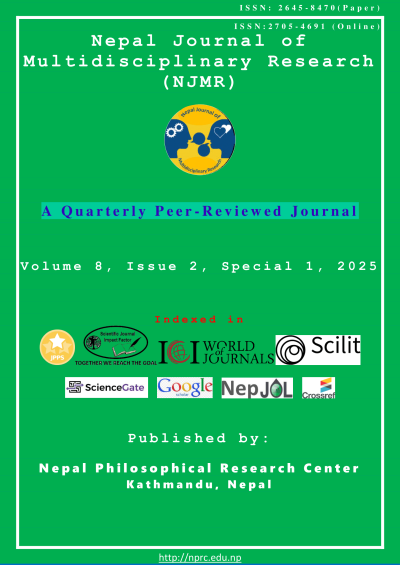Digital Transformation of Education: A Bibliometric Analysis of Artificial Intelligence in Learning
DOI:
https://doi.org/10.3126/njmr.v8i2.78026Keywords:
artificial intelligence, bibliometric analysis, education, learning, VOSviewerAbstract
Background: Artificial intelligence (AI) has significantly enhanced growth and productivity across various socioeconomic sectors, including education. By facilitating personalized, data-driven, and adaptive learning experiences, AI is reshaping educational pedagogies. The purpose of this study is to methodically examine the role of AI in education and to contribute to the existing literature concerning the future of learning.
Methods: To achieve the objective, a bibliometric analysis was conducted using the Dimensions database, covering research on AI in education and future of learning from 2016 to February 2025. VOSviewer was employed for bibliometric mapping, including citation analysis, co-citation networks, bibliographic coupling, and co-authorship analysis, to identify key research trends, themes and influential contributors.
Results: The findings indicate a notable increase in AI-related educational research, particularly from 2021 onwards, highlighting a growing academic interest in the field. Geographical analysis indicates that the United States and China are the most prolific in AI-related educational research, indicating the need of advancing the use of AI, especially in the developing countries. Addressing the differences in the use of AI across countries necessitates the strategic efforts to bridge technological gaps and promote inclusive of AI in education systems. The findings also underscore the importance of addressing ethical considerations, data privacy, and algorithmic biases to ensure equitable access to AI technologies. Furthermore, the examination of top academic journals reveals varying levels of influence, with some achieving high impact through select, highly cited publications.
Conclusion: The study emphasizes the transformative impact of AI on education, revealing a clear shift toward more personalized, adaptive, and data-driven learning environments. It also provides valuable insights into the evolving landscape of AI in education, emphasizing its interdisciplinary nature and transformative potential.
Novelty: By highlighting research trends, themes and key contributors, this study serves as a foundational resource for scholars seeking to navigate and advance the field. The study contribute to the broader discourse on AI in education, offering guidance for future research directions.
Downloads
Downloads
Published
How to Cite
Issue
Section
License
Copyright (c) 2025 The Author(s)

This work is licensed under a Creative Commons Attribution-NonCommercial 4.0 International License.
This license enables reusers to distribute, remix, adapt, and build upon the material in any medium or format for noncommercial purposes only, and only so long as attribution is given to the creator.




